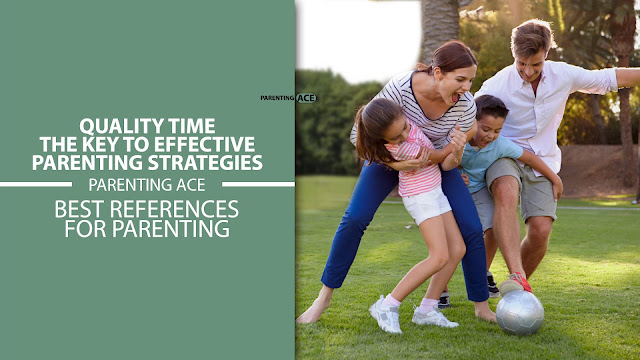Quality Time: The Essence of Effective Parenting Strategies
In the whirlwind of modern life, where time often feels like a scarce commodity, quality time with our children emerges as a precious treasure. In this blog post, we embark on a journey to explore the profound significance of quality time in effective parenting strategies. Beyond mere moments shared, quality time encapsulates the essence of meaningful interactions that foster deep connections, nurture emotional resilience, and lay the foundation for lifelong bonds. Join us as we uncover practical insights and strategies to prioritize quality time amidst the demands of daily life, enriching the parent-child relationship and cultivating a legacy of love and understanding.
 |
| Quality Time: The Key to Effective Parenting Strategies |
In the hustle and bustle of modern life, parents often find themselves juggling numerous responsibilities, from work commitments to household chores. Amidst these demands, carving out quality time for their children can seem like a daunting task. However, quality time lies at the heart of effective parenting strategies, playing a crucial role in nurturing strong parent-child relationships and fostering healthy development. In this comprehensive article, we delve into the concept of quality time, exploring its significance, benefits, and practical strategies for incorporating it into the parenting journey.
Understanding Quality Time
Quality time refers to focused, meaningful interactions between parents and children that nurture emotional connections, promote understanding, and create lasting memories. Unlike mere presence, quality time involves genuine engagement, active listening, and undivided attention to the child's thoughts, feelings, and experiences. It is not solely about the quantity of time spent together but rather the quality of the interactions during that time.
The Significance of Quality Time in Parenting
Quality time serves as a cornerstone of effective parenting for several reasons. Firstly, it strengthens the parent-child bond, fostering trust, security, and a sense of belonging. When children feel valued and heard during quality interactions with their parents, they are more likely to develop positive self-esteem and emotional resilience.
Moreover, quality time provides opportunities for learning and growth. Through meaningful conversations, shared activities, and collaborative problem-solving, parents can impart essential life skills, values, and knowledge to their children. These interactions also encourage intellectual stimulation, creativity, and curiosity, laying the groundwork for lifelong learning.
Furthermore, quality time helps parents stay attuned to their children's needs, interests, and developmental milestones. By actively participating in their children's lives, parents can better understand their perspectives, concerns, and aspirations, facilitating open communication and mutual respect.
Practical Strategies for Quality Time
Incorporating quality time into daily routines requires intentionality, creativity, and flexibility. Here are some practical strategies for maximizing quality time with children:
- Establish Rituals and Traditions: Create special rituals or traditions, such as weekly family game nights, Sunday morning pancake breakfasts, or bedtime storytelling sessions, that provide consistent opportunities for quality interactions.
- Be Present and Engaged: When spending time with your child, minimize distractions such as electronic devices or work-related thoughts. Focus on being fully present and engaged in the moment, actively listening and responding to your child's cues.
- Follow Their Lead: Allow your child to take the lead in choosing activities or topics of conversation during quality time. Whether it's playing their favorite game, exploring nature, or pursuing a shared hobby, follow their interests and let them guide the experience.
- Turn Daily Tasks into Quality Time: Transform routine activities such as cooking, gardening, or running errands into opportunities for quality time by involving your child and turning them into collaborative endeavors.
- Schedule One-on-One Time: Dedicate individualized, one-on-one time with each child to nurture unique connections and strengthen parent-child bonds. This could involve going for a walk, sharing a meal, or engaging in an activity tailored to their interests.
In conclusion, quality time stands as a fundamental pillar of effective parenting strategies, enriching the parent-child relationship and promoting holistic child development. By prioritizing focused, meaningful interactions, parents can create lasting memories, impart essential values, and foster emotional connections that endure a lifetime. In today's fast-paced world, the gift of quality time is perhaps one of the greatest legacies parents can leave for their children – one filled with love, understanding, and cherished moments shared together.



Comments
Post a Comment